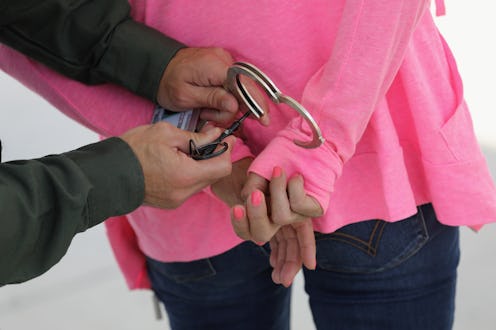News
Why Critics Say California Scrapping Cash Bail Could Do More Harm — Especially To Women

On Tuesday, California Gov. Jerry Brown signed into law a bill intended to overhaul a crucial part of the current criminal justice system. But although the law, formerly known as SB10, is historic in nature, critics say that eliminating California's cash bail program and replacing it with a risk assessment system could actually put even more people into jail before their trials, not less. And many of those critics were initially some of the bill's biggest champions.
Gina Clayton-Johnson, Executive Director of the Essie Justice Group, a nonprofit dedicated to reforming the criminal justice system on behalf of women with incarcerated loved ones, explains to Bustle why they rescinded their support:
At the end of the day we opposed the bill that we spent two years working on and supporting trying to drive through the legal process because the amended version — the last minute kind of 11th hour amended version — provided that in exchange for ending the bail industry, we were going to usher in a new set of policies that would ensure incarceration in our communities in a way that is worse than what we have currently.
The initial bill proposal didn't lend judges so much power in deciding who should be held between court dates, and many advocacy groups initially championed its proposal. But Clayton-Johnson says that changes were made at the very last minute, after votes had already been secured. If there had been enough time to publicly debate the amendments, she says, she doesn't believe the bill would have had as much support.
Essie wasn't the only organization to back out, either, per The Washington Post. Besides Essie, American Civil Liberties Union, Human Rights Watch, Civil Rights Corps, and California Attorneys for Criminal Justice all withdrew their support.
Many Democratic lawmakers in California are lauding the law as a success because they believe it removes some of the financial burden placed on those who are arrested. But in doing so, critics say it grants new powers to judges, allowing them to determine on a case-by-case basis who needs to be kept in holding between arrest, arraignment, and trial dates. Previously, Clayton-Johnson says, judges were only allowed to make those decisions for a very small subset of criminal offenses.
"Prosecutors can argue that preventative detention can take place for anybody who is charged with anything," she says.
Incarceration has a particularly adverse affect on women, whether or not they are the ones being held. According to Clayton-Johnson, many women with loved ones in prison shoulder a significant financial burden when another family breadwinner is incarcerated. And for those incarcerated, being imprisoned for even just 24 hours can lead to losing a job or, at least, valuable working hours, which can impact a whole household.
"It completely undermines the purpose for which black and brown women, formerly incarcerated, currently incarcerated, and low-income communities have been rallying around the cry for bail reform," Clayton-Johnson says of the newly-signed law. "That demand is one that was rooted in our understanding that the people who are right now incarcerated in pre-trail deserve to fight their cases from the outside just like every person who has money could."
But despite these concerns, some California Democrats believe that the law is, at least, a step in the right direction.
"We all agree that money bail is broken, and data shows that women bear the lion’s share of the financial and emotional hardships associated with that broken system," California state Sen. Robert Hertzberg, who represents parts of the San Fernando Valley, tells Bustle in a statement. "Not acting would have maintained the status quo, which already keeps poor women in jail indefinitely. Under SB 10, there will be no financial conditions for freedom."
The program is scheduled to undergo an independent review in 2023, according to the Post. Whether or not California has solved any of its pre-trial incarceration problems waits to be seen.